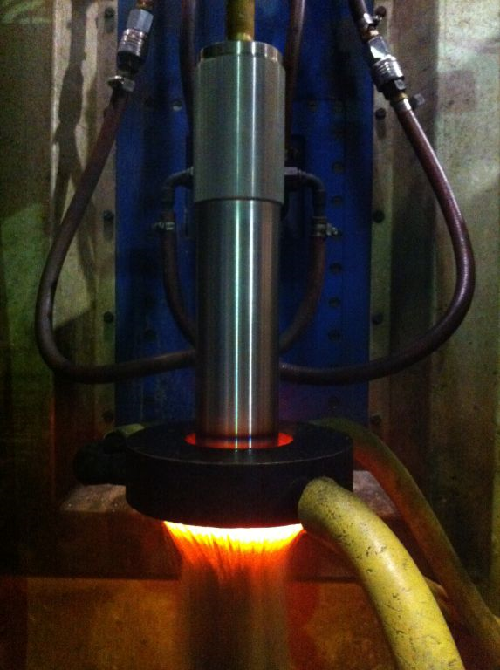
Alpha Detroit Heat Treatment specialises in induction hardening, providing precise and reliable solutions for your industrial heat treatment needs.
Induction Hardening: A Precision-Driven Process for Enhanced Metal Durability
Induction hardening modifies the surface properties of ferrous materials by generating localized heat through electromagnetic induction followed by immediate quenching, significantly increasing hardness while maintaining core toughness. Optimised thermal control ensures minimal distortion, preserving dimensional accuracy and structural integrity in critical machine components.
Hardness uniformity and depth depend on process parameters such as frequency, power density, and quenching medium, enabling manufacturers to tailor the hardening profile to specific operational requirements. Enhanced fatigue resistance and wear protection make this technique indispensable for automotive, aerospace, and heavy machinery applications. Precise energy application minimises material waste, delivering a cost-effective and repeatable heat treatment solution.
Achieving Uniform Hardness with Vertical Induction Scanners
Vertical induction scanners improve process consistency by precisely controlling heating and cooling cycles, ensuring uniform hardness distribution across component surfaces. Accurate coil positioning and scanning speed regulation refine the depth and extent of hardened layers, preventing localised weaknesses that compromise mechanical integrity.
• Electromagnetic Field Regulation: Ensures consistent induction heating, reducing hardness variation across complex geometries and eliminating uneven material properties that can lead to premature failure.
• Programmable Scanning Parameters: Provides precise control over heating depth and exposure time, optimising metallurgical outcomes without affecting the core structure of components.
• Automated Coil Adjustments: Adapts to diverse part dimensions, facilitating seamless integration into production lines while maintaining uniform heat distribution across varying geometries.
• Real-Time Process Monitoring: Detects thermal deviations during treatment, allowing instant corrective measures that safeguard material properties and prevent structural inconsistencies.
• Optimised Quenching Strategies: Minimises residual stress by ensuring even cooling rates, reducing the likelihood of material distortion and microstructural inconsistencies.
• Energy-Efficient System Design: Enhances sustainability by reducing power consumption while maintaining high throughput, optimising cost-effectiveness in large-scale manufacturing.
• Integration with Quality Control Systems: Allows continuous data acquisition, ensuring each treated component meets stringent industry hardness and performance standards.
• Versatile Application Across Industries: Supports the production of high-performance automotive drivetrain components, aerospace landing gear parts, industrial cutting tools, and heavy-duty mechanical assemblies where precise surface hardness and fatigue resistance are essential.
• Enhanced Process Repeatability: Ensures identical hardening results across multiple production cycles, maintaining consistent quality in mass manufacturing.
• Minimised Thermal Distortion: Reduces material warping by controlling heat penetration depth and uniform quenching, preserving dimensional accuracy in precision-engineered components.
Alpha Detroit Heat Treatment maintains a solid reputation for delivering precision-driven heat treatment solutions that adhere to stringent industry standards, ensuring optimal results for each project. Expertise in advanced heat treatment technologies enables us to offer customised services tailored to the specific needs of each client, demonstrating a commitment to both reliability and technical excellence. Secure advanced heat treatment processes with us that adapt to the evolving demands of your industry.
Optimized by: Netwizard SEO
